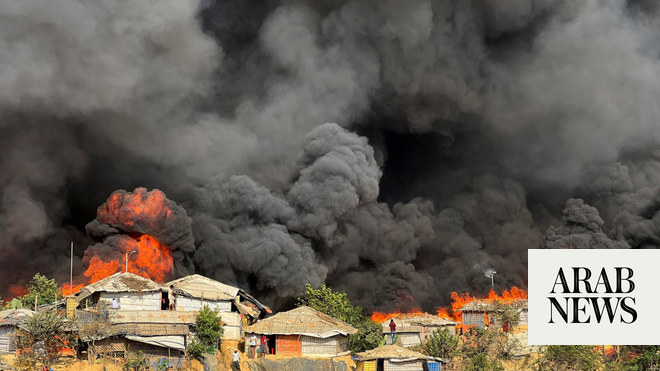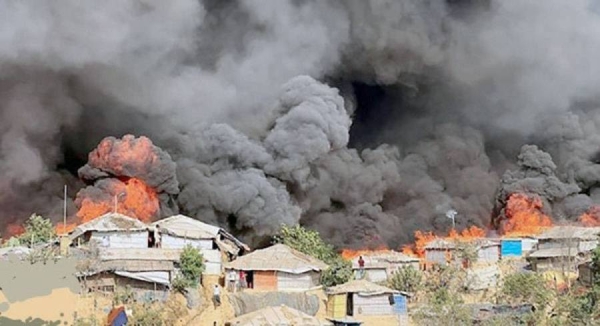
Thousands of people urgently require emergency shelter and aid after a fire destroyed Europe’s largest refugee camp, on the Greek island of Lesbos.
As the Athens government declared a state of emergency and a delegation of officials rushed to the north-eastern Aegean island, the sheer scale of devastation wrought by the overnight blaze became increasingly evident.
In the mangled wreckage of gutted facilities, incinerated tents and blackened containers, Moria was no more. The camp whose overcrowded and unsanitary conditions had spawned global outrage since its inception in 2015 had been erased.
“At this moment the reception centre has been completely destroyed,” Greece’s alternate migration minister, Giorgos Koumoutsakos, told reporters, saying it was miraculous there had been no deaths or injuries. “As a result, thousands of people are homeless.”
Calling the situation an “unprecedented humanitarian crisis”, the politician said the coronavirus pandemic had created “exceptionally demanding” circumstances on the island, long at the forefront of refugees fleeing war-stricken homelands for the west. Eyewitnesses reported terrified and traumatised residents fleeing the hilltop facility through thick, acrid smoke laced with the stench of burning plastic.
At least three dozen people living in the camp had been diagnosed with Covid-19 before the fire erupted. Local islanders’ fears that the virus could spread were exacerbated when authorities admitted that by late afternoon on Wednesday they had only managed to locate eight of them.
Echoing other government officials who had alluded to arson, Koumoutsakos said it appeared the blaze broke out “as the result of the discontent” among camp residents over lockdown measures being prolonged following a positive virus test for a Somali asylum seeker.
Firefighters who rushed to the scene as flames whipped by gale force winds enveloped the camp spoke of the fire bursting into life in at least three places, suggesting it had been deliberately lit.
“It broke out on multiple fronts,” the north Aegean fire brigade chief, Konstantinos Theofilopoulos, told the state-run TV channel ERT. As teams battled to extinguish the flames they had “met resistance” from stone-throwing refugees, he said.
In a national address, the prime minister, Kyriakos Mitsotakis, told Greeks the four-month-long state of emergency would mean “national funds and all national forces assisting” in relief efforts on the island. “I recognise the difficult circumstances,” he said, expressing sorrow over the fire. “However, nothing can become an excuse for violent reaction to health checks. And, more so, for unrest of this extent.”
With EU help initiatives would be taken to turn “an ugly experience … into a better reality,” the leader insisted. As a frontier state Greece had borne an overly “heavy weight” in dealing with the “European problem” of handling migrant waves, he said.
In the dawn light as firefighters struggled to douse the flames, authorities threw a six-mile cordon around the camp to prevent its former residents from attempting to reach Mytilene, the island’s port town and home to most of its 85,000 population. Riot police units were flown in for reinforcement from Athens as Mitsotakis convened an emergency meeting of top ministers in his centre-right government.
“It’s an atomic bomb,” said Michalis Frantzeskos, the island’s deputy mayor in charge of citizens’ protection, referring to infection rates possibly increasing in the wake of the devastating blaze. “People have headed to the mountains, they’re [scattered] everywhere.”
For most of the day thousands of men, women and children clutching their frugal belongings and under a police guard lined the main road connecting Mytilene with the camp.
The facility, which had been under Covid-19 lockdown since March, was more than four times over capacity when the inferno erupted, with close to 13,000 people living there.
By nightfall it was announced that around a thousand of the most vulnerable refugees with disabilities and health problems would be hosted in a ferry boat as emergency workers sought frantically to gather enough tents. Two naval ships will also be dispatched to the island by Thursday with around 3,500 tents providing temporary shelter, the Greek migration minister Notis Mitarachi told a press conference.
“Moria as we have known it cannot continue,” he said, pledging that Athens would press ahead with the creation of “closed” detention camps in which the movement of people will be monitored more closely.
The prospect of the facilities has been deplored by human rights groups.
The EU’s commissioner for home affairs said Brussels would fund the transfer to the Greek mainland of some 400 unaccompanied minors also hosted in Moria.
Long on the frontline of the refugee crisis, Lesbos has been a magnet for men, women and children moving westward from Afghanistan, Syria, Iraq, Pakistan and ever more increasingly western Africa.
Although numbers have dropped dramatically since their peak five years ago, rickety boats crammed with people still arrive from Turkey, circumventing increased patrols put in place when the Turkish president, Recep Tayyip Erdoğan, vowed to “open the gates” to Europe for hundreds of thousands of refugees.
More than 30 aid organisations, who have repeatedly described Moria as a stain on the consciousness of Europe, joined forces on Wednesday calling on the continent’s leaders “to share the responsibility for the reception and support of asylum seekers now more than ever”.












